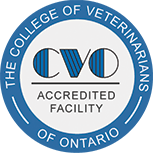Herd Health
Some of the diseases that horses can contract can occur at any time of the year (Tetanus, Strangles, Rabies). Other diseases are more common in the warm months, either because insects are active or disease exposure increases as horses travel and compete. Most horse owners opt to give the annual vaccines in the spring and boost for certain seasonal diseases one to two more times a year, depending on their horse’s exposure risk.
PLEASURE HORSES
Eastern and Western Encephalomyelitis, Tetanus, Rabies are considered our core vaccines and are highly recommended by our Veterinarians. West Nile Virus , Rhinopneumonitis-Influenza (intranasal or intramuscular preparations are available) +/- Potomac Horse Fever are recommended however we suggests you speak to one of the Veterinarians about the specific needs for your horse.
Horses that associate with outside horses benefit from a booster for Rhinopneumonitis and influenza in the fall.
SHOW/PERFORMANCE HORSES

Horses stabled at large stables, at racetracks or who travel often to compete:
Spring: Eastern and Western Encephalomyelitis, Tetanus, West Nile Virus, Rabies+/-, Rhinopneumonitis-Influenza (intranasal or intramuscular preparations are available), +/- Potomac Horse Fever (discuss the risk to your horse with the veterinarian) *Because there are numerous vaccines we always recommend splitting the vaccines into 2 visits.
Fall: Rhinopneumonitis-Influenza, Rabies+/-, Strangles (best to administer this vaccine on a separate appointment)
*** If you plan to travel south with your horse please contact us in advance so we can determine if there are any requirements within the state you are travelling to. If you plan to show on any of the winter circuits ie: Florida or California we can be sure your horse meets the specific vaccine requirements for the show grounds. ***
If a horse has never been vaccinated before or you are unsure of vaccine history, it will need a series of two vaccines/boosters spaced three to four weeks apart to get started.
PREGNANT MARES

The early months of pregnancy are critical for healthy organ development of the fetus. For this reason, we try to avoid all drug administration of any sort, including vaccines and dewormers, in the first 60 days of pregnancy.
Five, Seven, and Nine Months of Gestation: Pregnant mares are at risk of abortion from rhinopneumonitis. We recommend vaccinating with Pneumabort K which covers the abortion strain of rhinopneumonitis. The vaccine should be given at five, seven, and nine months of gestation.
Ten Months of Gestation/1 month prior to foaling: Vaccinate for Rhinopneumonitis -Influenza, Eastern and Western Encephalomyelitis, Tetanus, West Nile Virus, Strangles and Potomac Horse Fever (if the farm vaccinates for this disease).
FOALS

Foals receive some immunity from their dams at birth as the first milk, colostrum, contains antibodies that help protect against infectious disease. Foals should have a blood test run soon after birth to be sure they have received adequate immunity from their mothers. Foals who nurse well and absorb antibodies at birth should wait for their first vaccinations until they are six months of age.
The following schedule is advised:
6 Months: Eastern and Western Encephalomyelitis Tetanus, West Nile Virus, Rabies, Rhinopneumonitis-Influenza ** If the foal is in a high risk barn please discuss options for vaccinating your foal earlier
+/- Potomac Horse Fever—This vaccine is given regularly to a number of horses in the area, if you have questions about PHF don’t hesitate to call the clinic to discuss with Sarah, or one of our Veterinarians.
7 Months: Repeat above vaccines, referred to as Booster Vaccines.
12 Months: Repeat all of the above vaccines
Strangles vaccine can be given to foals if they are located in a high risk area. It is administered intranasally in a series of two vaccines spaced at least three weeks apart. We recommend that the Strangles vaccination be done at a separate appointment from other vaccines. You should discuss the risk potential for Strangles on your farm with a veterinarian.



